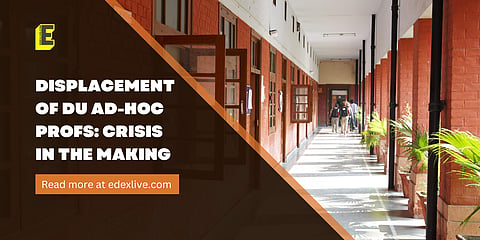

Describing the displaced ad-hoc faculties as "exceptional in their respective fields," Dr SK Sagar emphasises the devastating impact they face, stating, "These professors are left feeling bereft of hope every day.”
Dr Sagar, a senior professor from the Department of Zoology at Swami Shraddhanand (SSN) College, Delhi University (DU), recently resigned from his position as Teacher-in-charge (TIC) in protest against the displacement of ad-hoc faculties. He references the tragic suicide of ad-hoc Professor Samarvir, who took his own life on April 26 after being displaced from Hindu College a few months earlier and says, “The displacement is unfair, unjust and seemingly targeted or intentional,” as he proceeds with the conversation, often calling the displaced professors bachche (children in Hindi).
On May 15, Dr Sagar submitted his resignation letter as the TIC, where he stated, “It is very difficult to continue as TIC of zoology Department…as the displacement of the ad-hoc faculties was done by the college in the category of SC and ST in the interviews.” (sic)
In his conversation with EdexLive, the professor reiterates this point and explains that the reserved category professors, or the "soft targets", are the ones facing the highest displacement. He further emphasises that this goes against the mandate of the Delhi University Teachers' Association (DUTA), but the union has not taken any meaningful action. "DUTA had planned to shut down the entire university if displacements were to occur, but currently, there seems to be no action at all," expresses the professor.
What is DUTA doing?
Although the DUTA president was unavailable for comments, former president Prof Abha Habib Dev shares her perspective, saying, "DUTA is leading the action programme, but their intentions are lacking because the members themselves have directly or indirectly benefited from this recruitment system." She also points out that this lack of confidence in DUTA's actions is the reason why most teachers are sceptical about its support.
Several DU professors have made allegations against the recruitment panels, claiming that candidates with certain connections and affiliations are being favoured over merit-based selection. Additionally, reservation rules are being disregarded. Dr Sagar also highlights this in his resignation letter, drawing attention to how the EWS category seats in his college were left vacant under the pretext of "Not Found Suitable" (NFS). "The candidates from EWS categories were highly qualified, and I have personally witnessed their capabilities, yet those seats remained unfilled," he states.
"The recruitment panel should be abolished, and DUTA needs to take action to make this happen," Dr SK Sagar asserts. "Only one professor took his life, but countless others are being affected daily—professors and their families." It has been reported that a large number of professors are facing mass displacement, and Dr Sagar reveals that the entire Zoology department of Hansraj College has been affected.
The regularisation of ad-hoc professors at DU has escalated into a crisis, particularly following the tragic demise of Prof Samarvir. Students and professors from various DU colleges have condemned his death as an "institutional murder". The demand for absorbing ad-hoc professors, some of whom have dedicated decades to the university without obtaining permanent status, has been a longstanding issue raised by the teaching staff.
The university recently initiated a screening process and interviews to facilitate the regular hiring of these professors. However, over the past two months, numerous professors with years of experience as lecturers at DU were displaced, despite not making the cut for the interview. "They are conducting interviews with 1300 candidates in just 4-5 days. How is it possible to assess the calibre of each candidate by allocating only a few minutes to them?" asks Prof Habib as she concludes.
